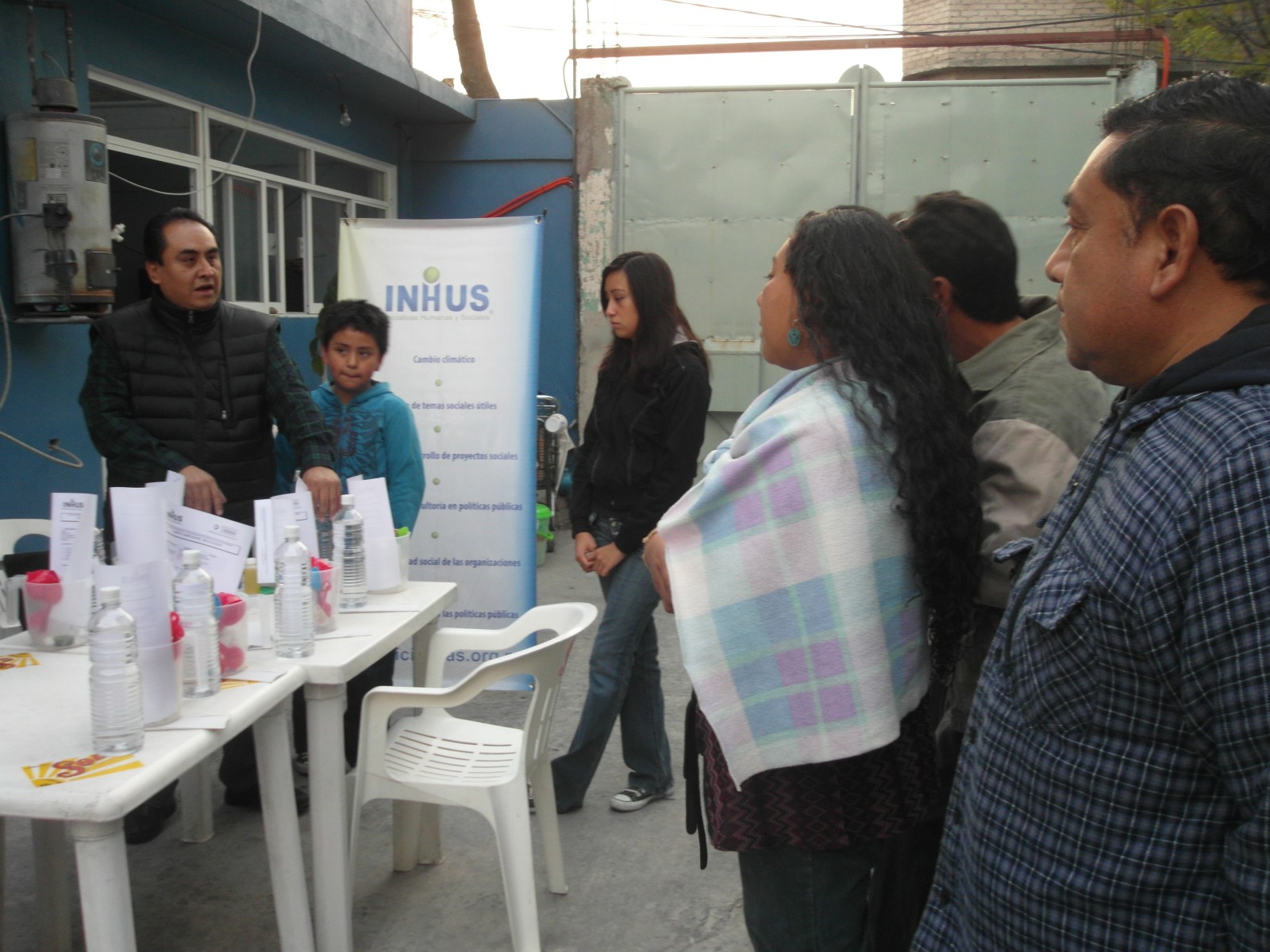Iniciativas Humanas y Sociales A.C.
- Mexico City, Mexico

Organizational Overview
Iniciativas Humanas y Sociales A.C. (INHUS) is a well-established NGO based in Mexico City with a proven track record in social research, civic participation, and public policy advocacy. Although informally founded in 1989, it was officially incorporated in 2007. INHUS aims to foster positive societal change by training community and church leaders, advocating for public policy reforms, and developing impactful social projects. The organization focuses on civic leadership development, violence and corruption prevention, and economic development in marginalized communities, with operations primarily in eastern Mexico City, the State of Mexico, and Guanajuato. It also engages in state-level and national policy advocacy, with a particular focus on the prevention of gender violence, public integrity and anti-corruption efforts.
INHUS has built strategic partnerships with institutions like the Centro de Investigación y Docencia Económicas (CIDE), Universidad de Guadalajara, and COPARMEX (Mexico’s leading business association), along with international collaborations with organizations such as the German Alliance for Integrity, Junior Chamber International, and USAID. These partnerships have bolstered its influence on national discussions related to transparency, access to justice, public integrity and governance. Key initiatives include the Centro RUAH, founded in 2019, which equips community and church leaders with technical skills and spiritual strength to influence public affairs, the Observatory of Social and Gender Violence (2013), focusing on research and policy aimed at gender violence prevention and systemic change, and the ADEA Network (2014), which strengthens small businesses and entrepreneurs, especially in agribusiness. Through these efforts, INHUS promotes community development, leadership growth, public policy advocacy and sustainable social transformation.
Beneficiary Population
- Urban Poor
- Women
- Families
- Leaders
- Entrepreneurs
Focus Areas
- Leadership Development & Training
- Community Development
- People & Family-Centered Development
- Wealth Creation & Economic Development
- Broad-based Transformation & Systemic Change
Organizational Track Record
Since 1989, INHUS A.C. has spearheaded various social programs aimed at community development, food security, public safety, and civic engagement, beginning in Iztapalapa, Mexico City. Following its official incorporation in 2007, the organization launched two key initiatives: the Reading Promotion Program (PFL), focused on engaging young people, and the Skills Development for Self-Sufficiency Program (PDHA), which trained over 500 vulnerable individuals—including people with disabilities, female heads of households, and elderly women—in income-generating activities such as producing cleaning products and food items made from chocolate and nopal. By 2011, INHUS expanded its operations to the municipalities of Nezahualcóyotl, Ecatepec, La Paz, Ixtapaluca, and Chimalhuacán in the State of Mexico. In 2014, INHUS expanded its work to the Tláhuac and Milpa Alta regions (on Mexico City’s easter side), focusing on promoting women’s entrepreneurship through agro-production initiatives. That same year, INHUS launched the ADEA Network to enhance the operational efficiency and regulatory compliance of small businesses across Mexico, Panama, and Texas, in connection with the Junior Chamber of Commerce, showcasing its ability to drive cross-border impact in both social and business development. In 2019, the organization launched Centro RUAH, a leadership development center for community and church leaders. By 2020, INHUS broadened its impact to León, Guanajuato, through the Citizens of Light and Salt Project, helping to form citizen groups and establish observatories in states like Sonora, Veracruz, and Nuevo León. INHUS A.C. has demonstrated a strong commitment to social research and policy advocacy, beginning with the establishment of the Cuitláhuac Observatory in 2007, which was restructured in 2013 into the Observatory of Social and Gender Violence. This observatory has conducted extensive research and coordinated social initiatives across 11 municipalities in Mexico City and the State of Mexico, reaching a population of 8 million people. In 2015, it became a key advocate for the declaration of the Gender Violence Alert in these municipalities, influencing public policy and designing impactful social projects, both independently and in collaboration with partners.. Since 2013, INHUS has also been at the forefront of national anti-corruption efforts and been a driving force behind the “Ley 3 de 3” movement which played a pivotal role in the creation of Mexico’s National Anti-Corruption System in 2016. INHUS was among the first organizations to assess government compliance with the National Transparency Platform, launched in 2016, and continues to pioneer work in transparency and accountability. In 2022, INHUS partnered with USAID and the United Nations Development Programme (UNDP) to publish a book on public compliance and integrity policies, further solidifying its leadership in governance and ethical business practices.
Key Leader Biosketch
Pedro Carta Terrón is a seasoned civil society leader, researcher and business consultant from Mexico City, with over three decades of experience in social change, public policy, and business consulting. He began his journey in community work following the 1985 Mexico City earthquake, where he was actively involved in rescue efforts and providing support to survivors. His passion for service led him to theological studies and sparked his enduring commitment to community development, missional work, and public advocacy. In the 1990s, Pedro’s leadership evolved as he trained community and church leaders on food security, public safety, and civic engagement. His efforts earned him roles in public security and urban development, where he contributed to public security reforms and organized citizen-led initiatives to address local issues, contributing to his in-depth understanding of municipal governance. His expertise grew through his consultancy work and as an official in the Mexican federal government, where he was instrumental in shaping public transparency and anti-corruption policies, helping strengthen governance at the national level. In 2007, Pedro formally founded Iniciativas Humanas y Sociales A.C., a non-profit organization focused on implementing social projects and influencing public policy across Mexico. His extensive contributions have made him a prominent voice on issues such as urban violence, gender-based violence, and anti-corruption. His leadership has been recognized by numerous international organizations, including the United Nations Development Programme (UNDP), USAID, and German Alliance for Integrity, solidifying his reputation as an expert in governance, transparency, and public integrity. From 2016 to 2020, Pedro served as National Vice President of the Anti-Corruption Commission of COPARMEX, Mexico’s leading business umbrella organization. In this role, he played a key part in advancing anti-corruption legislation and promoting corporate integrity across the private sector. His work with COPARMEX, alongside his ongoing collaborations with international agencies, reflects his deep expertise in shaping ethical business practices and contributing to national anti-corruption frameworks. In recent years, Pedro has led significant research projects, including as lead researcher for the World Justice Project’s Open Justice Metrics in Mexico (2023), and in establishing guidelines on integrity and anti-corruption policies for the private sector in collaboration with GIZ Germany (2022). His research for the Center for Economic Research and Teaching (CIDE) in 2021 focused on evidence-based accountability models during emergencies. Pedro holds a Ph.D. in Education, alongside advanced degrees in Administration, Public Policy, and Law. He has published over 20 works on topics like transparency, governance, public integrity, and violence, and continues to actively contribute to cutting-edge research and policy development. Currently, he is a member of the board of directors of Camino Alliance LATAM, where he focuses on building the Urban Research Institute.

Funding History with Camino Alliance
So far, Camino Alliance has not directly funded any INHUS projects. However, in 2016, INHUS A.C. established a connection and began collaborating with the current director of Camino Alliance LATAM, initially through the work of the Observatory of Social Violence in the eastern part of Mexico City. As the relationship evolved—predating the founding of Camino Alliance LATAM—INHUS worked closely with the director, focusing heavily on anti-corruption efforts and advancing social, legislative, and advocacy initiatives, particularly in the State of Mexico. One of the key achievements of this collaboration was the successful advocacy for a citizen participation law, which became part of the National Anti-Corruption System and was approved by Congress in early 2020. This partnership not only laid the foundation for long-term collaboration but also contributed significantly to strengthening citizen engagement in governance and promoting transparency. Currently, the founder of INHUS works closely with Camino Alliance to establish an Urban Research Institute, focusing on social and community-based research around issues of urban fragility and migration. This emerging institute will support the broader goals of Camino Alliance by advocating for transformational change, including necessary public policy shifts, to improve conditions in urban poor communities.
